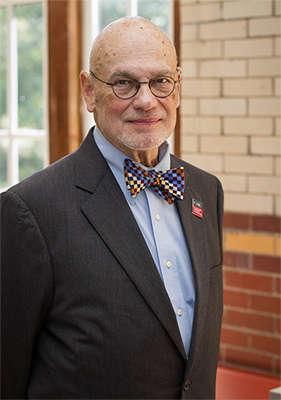Remembering Fran McMichael
Fran McMichael, emeritus professor and former Civil and Environmental Engineering department head, had a significant impact on CMU as a teacher, mentor, colleague, and researcher.
Francis Clay McMichael, emeritus professor of engineering at Carnegie Mellon and former civil and environmental engineering department head, passed away on July 28, 2018 at 80 years old. McMichael left a profound legacy at Carnegie Mellon, which he joined in 1967. He had been a faculty member in both Civil and Environmental Engineering (CEE) and also in Engineering and Public Policy (EPP). He was the CEE department head from 1975-1979, and was appointed the first Walter J. Blenko, Sr. Professor of Environmental Engineering in 1981. He graduated from Girard College in 1954, a primary and secondary school for single parent children in Philadelphia. McMichael earned a B.S. in Mining Engineering (1958) from Lehigh University, and an M.S. in Geophysics (1959) and a Ph.D. in Civil Engineering (1963) from the California Institute of Technology. Following a postdoctoral research appointment at CalTech, McMichael joined the Department of Civil Engineering at Princeton University. He was recruited in 1967 to the Mellon Institute at Carnegie Mellon to join the American Iron and Steel Institute Water Resources Group. He was appointed in the departments of Civil Engineering and Engineering and Public Policy in 1972. He was an influential teacher, mentor, colleague, and friend to many, and remained an active part of the college after transitioning to Emeritus Professor in 2002.

Source: College of Engineering
Dr. Francis Clay McMichael, emeritus professor of engineering and former CEE department head.
CEE Department Head David Dzombak, a student of McMichael as an undergraduate at Carnegie Mellon in the 1970s, said of his mentor, “Fran McMichael had a broad background in engineering and science, and a wide spectrum of interests. He brought his brilliant, interdisciplinary perspectives to work every day to inspire students and colleagues in the classroom and in research project meetings. He built the environmental engineering program at Carnegie Mellon, starting with a tremendous volume of teaching and research of his own in the 1960s and 70s, and then leading efforts to hire others to expand the environmental engineering program. The program has been consistently ranked as among the top environmental engineering programs in the nation for decades. He was a mentor and friend to generations of students and faculty members at Carnegie Mellon, including during his 16 years in emeritus status. CEE owes Fran McMichael a lot and we will miss him greatly.”
EPP Professor and former Department Head Granger Morgan, a long-time colleague, said, “Fran was committed to letting the numbers—the data—drive the answers to the environmental problems he tackled. He held his students and colleagues to that same standard insisting that they should never make claims that their analysis couldn't clearly support. He was a ‘dirty-hands engineer’ in the best sense of that word. He believed in seeing and interacting directly with the systems he studied and the issues he addressed. A regular question to students was ‘Have you ever seen one? How big is it? Is it bigger than a breadbox?’ Fran developed a reputation for being a tough guy—but while he was demanding, and had little patience for shoddy work or shallow analysis, he cared deeply about his students and was a devoted friend to his colleagues.”
He built the environmental engineering program at Carnegie Mellon, starting with a tremendous volume of teaching and research of his own.
David Dzombak, Department Head, Civil and Environmental Engineering, Carnegie Mellon University
In addition to his contributions to CEE and EPP, McMichael was instrumental in founding the Green Design Institute at Carnegie Mellon, along with CEE Professor Chris Hendrickson and Professor Lester Lave of EPP and the Tepper School. Through the Institute, he sought to address product design that attempts to minimize the use of non-renewable resources and the spread of toxic materials. His green design research applied concurrent engineering concepts to the design of products and processes to mitigate environmental impacts over their entire life cycle. He published extensively on topics from environmental engineering, to life cycle analysis, to technology and design assessment for integrated waste management. He was well-known as one of the nation’s leading researchers and educators in interdisciplinary engineering-based environmental problem solving.
“Dr. McMichael’s influence on the college and the field of environmental engineering was indispensable, both as department head and as a professor,” said Dean of the College of Engineering Jim Garrett. “He asked probing questions and he pursued the truth no matter the consequences to him. He was an inspiration to many, including me. He will be greatly missed.”
We express condolences to the family and friends of Dr. McMichael. We remember his commitment to engineering and research, full of energy and creativity.
